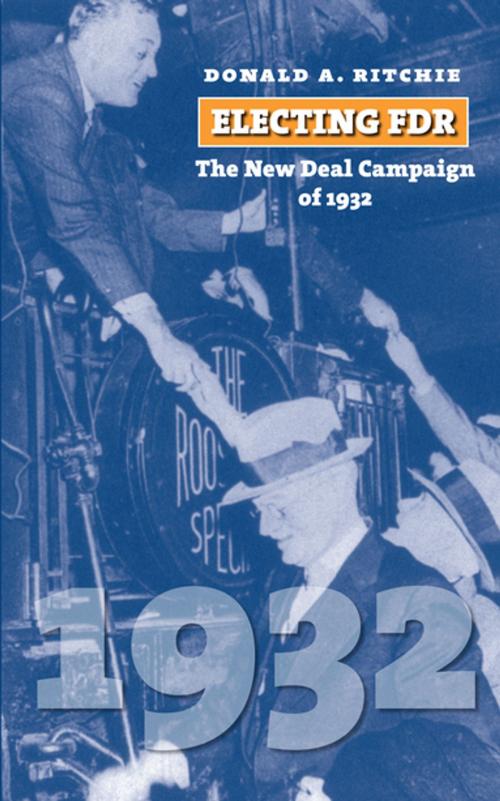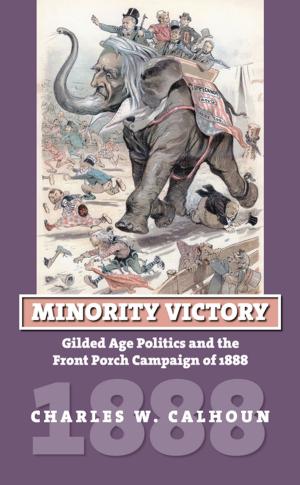Electing FDR
The New Deal Campaign of 1932
Nonfiction, Social & Cultural Studies, Political Science, Government, Elections, Politics, History & Theory, History, Americas, United States, 20th Century| Author: | Donald A. Ritchie | ISBN: | 9780700625352 |
| Publisher: | University Press of Kansas | Publication: | October 20, 2017 |
| Imprint: | University Press of Kansas | Language: | English |
| Author: | Donald A. Ritchie |
| ISBN: | 9780700625352 |
| Publisher: | University Press of Kansas |
| Publication: | October 20, 2017 |
| Imprint: | University Press of Kansas |
| Language: | English |
George Pendleton Prize
With the landmark election of Franklin Delano Roosevelt in 1932, decades of Republican ascendancy gave way to a half century of Democratic dominance. It was nothing less than a major political realignment, as the direction of federal policy shifted from conservative to liberal—and liberalism itself was redefined in the process.
Electing FDR is the first book in seventy years to examine in its entirety the 1932 presidential election that ushered in the New Deal. Award-winning historian Donald Ritchie looks at how candidates responded to the nation's economic crisis and how voters evaluated their performance. More important, he explains how the Democratic Party rebuilt itself after three successive Republican landslides: where the major shifts in party affiliation took place, what contingencies contributed to FDR's victory, and why the new coalition persisted as long as it did.
Ritchie challenges prevailing assumptions that the Depression made Roosevelt's election inevitable. He shows that FDR came close to losing the nomination to contenders who might have run to the right of Hoover, and discusses the role of newspapers and radio in presenting the candidates to voters. He also analyzes Roosevelt's campaign strategies, recounting his attempts to appeal to disaffected voters of all ideological stripes, often by altering his positions to broaden his popularity.
With the advent of the New Deal, Americans came to enjoy a wide federal safety net that provided everything from old age pensions to rural electricity-government innovations so embraced by voters that even later conservative presidents recognized their importance. Ritchie traces this legacy through the Reagan and Bush years, but he relates how FDR in 1932 was often vague about the specifics of his program and questions whether voters really knew what they were in for with the New Deal.
As pundits, politicians, and citizens eye the upcoming 2008 campaign, Electing FDR reminds incumbents not to take their party support for granted or to underestimate their opponents-and reminds students of history that understanding the New Deal begins with the 1932's transformative election.
George Pendleton Prize
With the landmark election of Franklin Delano Roosevelt in 1932, decades of Republican ascendancy gave way to a half century of Democratic dominance. It was nothing less than a major political realignment, as the direction of federal policy shifted from conservative to liberal—and liberalism itself was redefined in the process.
Electing FDR is the first book in seventy years to examine in its entirety the 1932 presidential election that ushered in the New Deal. Award-winning historian Donald Ritchie looks at how candidates responded to the nation's economic crisis and how voters evaluated their performance. More important, he explains how the Democratic Party rebuilt itself after three successive Republican landslides: where the major shifts in party affiliation took place, what contingencies contributed to FDR's victory, and why the new coalition persisted as long as it did.
Ritchie challenges prevailing assumptions that the Depression made Roosevelt's election inevitable. He shows that FDR came close to losing the nomination to contenders who might have run to the right of Hoover, and discusses the role of newspapers and radio in presenting the candidates to voters. He also analyzes Roosevelt's campaign strategies, recounting his attempts to appeal to disaffected voters of all ideological stripes, often by altering his positions to broaden his popularity.
With the advent of the New Deal, Americans came to enjoy a wide federal safety net that provided everything from old age pensions to rural electricity-government innovations so embraced by voters that even later conservative presidents recognized their importance. Ritchie traces this legacy through the Reagan and Bush years, but he relates how FDR in 1932 was often vague about the specifics of his program and questions whether voters really knew what they were in for with the New Deal.
As pundits, politicians, and citizens eye the upcoming 2008 campaign, Electing FDR reminds incumbents not to take their party support for granted or to underestimate their opponents-and reminds students of history that understanding the New Deal begins with the 1932's transformative election.















